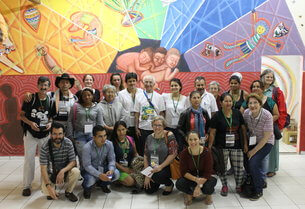“We stress the need to return to the sources of the New and Old Testament, where God is committed to impoverished people with distributive justice, where the land is considered as a gift, an inheritance that can not be concentrated, destroyed and commodified. From this deep conviction, true theology must be based on love and solidarity with the impoverished, excluded and victimized people,” said participants in a letter from the fourth meeting of the Faith and Territories Network in Sao Paulo, Brazil.
Under the motto, “The Strength of Faith in Direct Action in Defence of Territories”, the meeting explored the intersection of religious practice and spirituality, and fervent concern for the “territory” – the oikumeme or common house – in which we live.
Participants took a closer look at how faith is lived out when one’s “territory” is marked by a model of development that disregards humans and nature, and focuses on profit and benefits for a minority. The aim was to develop new theological paradigms and praxis to support communities’ struggles for sustainability and eco-justice.
“Local communities – be they Indigenous, of Afro-descendant, quilobolas [descendants of Afro-Brazilian slaves] or poor Mestizo [of combined European and Amerindian descent] farmers – are facing the monstrous power of mega, international corporations,” stated Paulo Ueti, Anglican Alliance Facilitator for Latin America and the Carribean, who took part along with the Revd Emilie Smith, from the Anglican Church of Canada and co-president of The Oscar Romero International Christian Network in Solidarity with the Peoples of Latin America (SICSAL).
Representatives of local communities spoke of their struggle to safeguard the integrity of their common house in the face of powerful mining and petroleum companies, palm oil producers, widespread single-crop agricultural operations and militarisation in general.
It became clear that community organising has been core, along with rooted advocacy work. “A tool in the struggle has been refined, renewed interpretations of Scripture through contextual bible study and study of texts such as Pope Francis’s Encyclical, Laudato Si’ – On Care for Our Common Home,” Emilie remarked.
For Anglicans, the Marks of Mission were foundational, he added, in particular the fifth Mark, which commits to “strive to safeguard the integrity of creation and sustain and renew the life of the earth and build peace and reconciliation”.
Theologians from the Episcopal Anglican Church of Brazil, as well as from SICSAL, the Pastoral Commission for the Land (Comissão Pastoral da la Terra – Brazil), the National Council of Churches of Brazil, and Pueblo Indio (Ecuador) invited further reflection on links between current struggles for eco-justice, and past and present expressions of faith and spirituality.
“We welcome this comprehensive, theologically-rooted approach and commend it to others across the Communion” said the Revd Andy Bowerman, Co-Executive Director of the Anglican Alliance.
The meeting also lifted up Indigenous and Afro-descendant expressions of the sacredness of all Creation, and participants grieved over historic and ongoing destruction of spiritual heritage.
“Traditional beliefs and practices have been lost, even intentionally destroyed, in the past through acts of conquest and enslavement. This continues today with the invasion of industry, where agribusiness, mining companies and mega infrastructure projects affect nature and the most vulnerable communities,” Paulo noted.
He reported how, in a moving moment, participants offered apologies for such acts of destruction, and for the general harm that had been done to the Earth.
The meeting concluded with the participants’ firm promise to share what they’d learned in their respective communities. In their letter from the meeting, they pledged to be “doers of the Word, not merely hearers of the Word”.
For Paulo and Emilie, this is another way of responding to the question of the renewed Baptismal Covenant of the Episcopal Anglican Church of Brazil: “Will you strive to safeguard the integrity of God’s creation, and respect, sustain and renew the life of the Earth?”
“We are greatly encouraged to see the outcomes from this gathering. We will ensure that they join with vulnerable voices from around the Communion as we build momentum towards the COP21 meetings in Paris later this year,” Andy said.
“The Anglican Alliance is committed not only to be the voice of the voiceless but also to enable those often quiet voices to be heard at the centres of power and influence.”
The Faith and Territories meeting took place 25-27 September at the Florestan Fernandes School of the Landless Workers’ Movement (MST). A fifth gathering is to be held in Medellin, Colombia, in 2018.
Photo: Faith and Territories meeting participants. Credit: Paulo Ueti

